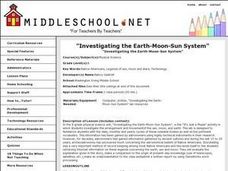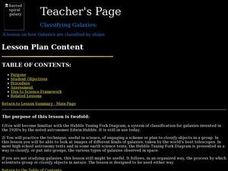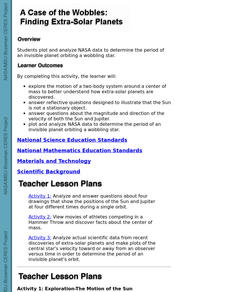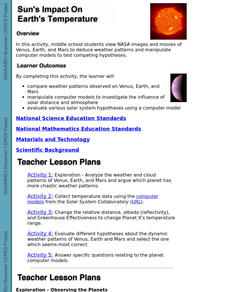Curated OER
Fuel Mystery Dis-Solved
Students describe how temperature and surface area exposure affect the rate at which fuel is consumed. They explain why engineers want to know about the properties of a fuel when designing rockets. They create a bar graph of result data.
Alabama Learning Exchange
The History of Space Exploration
Young scholars research and identify important events in the history of space exploration. They work in groups of three to four in order to research an important astronaut and record their finding on a poster board and present to the class.
Curated OER
Nutrition in Space
Pupils compare and contrast the process of dehydration with the processes of freezing and canning. They predict energy sources that may be accessible in the future in different environments such as the moon and planets, most notably Mars.
Curated OER
Mission Impossible! Are We Alone in the Universe, or Are We Just One of Its Citizens?
Students examine NASA strategy for scientifically studying any celestial body. They brainstorm about all previous space explorations and missions they can recall, and propose an expedition plan to become space explorers of the future.
Curated OER
Hydroponics
Students discuss the concept of hydroponics. They create and run their own hydroponics system. They record and analyze the data they collect.
Curated OER
Space Travel Brochure
Students discover information about the planets and the solar system. They work together to research a specific planet. They develop a brochure for the planet and share with the class.
Curated OER
A Place In Space
Pupils work together to create a 3D coordinate system. They plot points that are given to them and asked to find these points in space. They discover how engineers use coordinates in their careers.
Curated OER
Space
First graders examine space in this unit of lessons. They create a KWL chart and write in their journals about space. They also examine the phases of the moon and identify the constellations.
Curated OER
Rain
Students create a dance based on the sounds they hear during a recording of rainstorm. They learn the elements of dance and explore the environment.
Curated OER
Guided Reading "In the Night Sky"
Learners participate in a variety of reading exercises, such as choral reading and reading response journal, to reinforce concepts about space and nocturnal animals.
Curated OER
Investigating the Earth-Moon-Sun System
Eighth graders research Native American legends involving the sun, moon, and stars and compare them to the origin of present day knowledge. They create a written report and make an oral presentation of their findings to the class.
Curated OER
Classifying Galaxies
Young scholars classify galaxies by their shape using the Hubble Tuning Fork Diagram.
Curated OER
SKY PATHS: STUDYING THE MOVEMENT OF CELESTIAL OBJECTS
Students observe the position of an object in the sky by describing its location relative to another object or the background, describe an object's motion by tracing and measuring its position over time, and create their own myths about...
Curated OER
Land Safely...
High schoolers model the preparation needed for a soft-landing on a planet or object in space. They do this by packaging a raw egg with certain material, and dropping the egg from a given height to test the packaging effectiveness.
Curated OER
Planets And Moons Web Quest
Students work with a partner using the Internet to find the answers to a web quest about space exploration. They work in cooperative groups to discuss information and evaluate its importance to space exploration.
Curated OER
Power Point Slide Show
Students use a website to gather information about a planet and its moons. They work in small groups to plan a slide show presentation on a planet and its moon using a Power Point Template.
Curated OER
Working in Space
Students design and build one of three engineering problems dealing with living and working in space.
Curated OER
Exploring Space Fiction
Students visit web sites with information on space fiction and collect information for their stories.
Curated OER
Space Adventure
Students demonstrate comprehension skills, including reading strategies, inference, literal meaning, and critical analysis.
Curated OER
Finding Extra-Solar Planets
High schoolers plot and analyze NASA data to determine the period of an invisible planet orbiting a wobbling star. They explore the motion of a two-body system around a center of mass to better explain how extra-solar planets are...
Curated OER
Sun's Impact On Earth's Temperature
Pupils view NASA images and movies of Venus, Earth, and Mars to deduce weather patterns and manipulate computer models to test competing hypotheses. They manipulate computer models to investigate the influence of solar distance and...
Curated OER
Lift Off with Rockets!
Students obtain information concerning rockets and the use of them in space, create their own rocket on the computer with the graphic choices on the website www.goobo.com, and write descriptive words or phrases to describe their rockets.
Curated OER
Mercury, Venus, and Earth
Students learn information about the planets Mercury, Venus, and Earth by playing a trivia game.
Curated OER
Mass and Space
Students view a variety of sculptures analyzing how space and mass interact, and how sculptors make choices about mass and space to express meaning in their art. They make small three-dimensional sketches experimenting with mass and space.

























